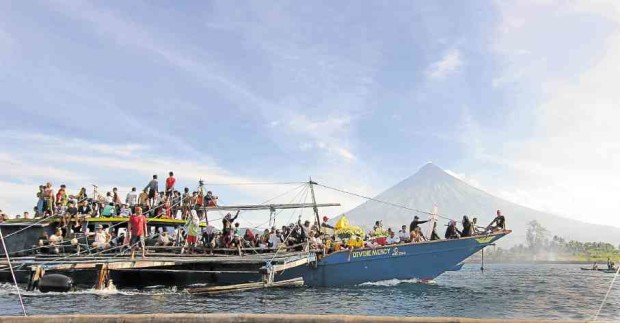Marian tradition lives on in the sea off Albay island

HUNDREDS of devotees from Barangay Tayhi and other coastal villages join the maritime procession for the image of Nuestra Señora de Peñafrancia in Tabaco City, Albay. GEORGE GIO BRONDIAL/INQUIRER SOUTHERN LUZON
TABACO CITY—After surviving Typhoon “Walding” that killed 995 people in Bicol in 1952, Ceferino Buendia woke up from a dream about receiving divine instruction to continue a tradition that their forefathers started for the Virgin Mary in Albay province.
With his wife, Sofia Belchez, and brother, Quising Buendia, the family from Natunawan Island continued the maritime procession for the Nuestra Señora de Peñafrancia, patroness of the Bicol region, and the Divino Rostro (Holy Face of Jesus) in the village of Tayhi here, where they took shelter after fleeing the typhoon’s wrath.
Walding (international name: Trix), which hit Bicol in October 1952, was among the deadliest typhoons to batter the Philippines.
Residents of Natunawan decided to abandon the island for fear of stronger and more destructive storms.
“My father told village folk that he would continue the tradition, even if no one joins him. But then, 50 other devotees showed up. And now, each year, more and more devotees go to Natunawan even though no one lives there anymore,” said Lorenzo Buendia, 68, Ceferino’s eldest son.
Article continues after this advertisementThe image of the Blessed Virgin Mary, locally called “Ina,” is carried by men and loaded on a fishing vessel while women sing hymns.
Article continues after this advertisementFishermen from Tayhi and nearby villages lend their vessels for the procession or “karakol.” The largest boat that bears Ina is called “taksay.” Any devotee, including women, children and the elderly, may board it during the procession.
“On his deathbed, my father asked me to continue the tradition,” Lorenzo said.
At least 1,000 devotees from Tayhi and neighboring communities, aboard at least 50 boats, joined the five-hour sea procession off the shores of Tabaco City on Sept. 3.